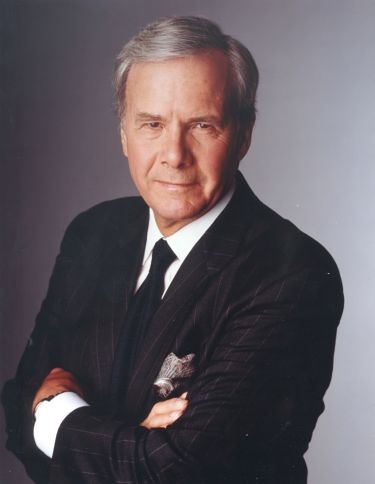Thomas J. Brokaw
Class of 2007
- Former Anchor and Managing Editor/Special Correspondent NBC Nightly News/NBC News

It's easy to make a buck. It's a lot tougher to make a difference.
Tom Brokaw was born in Webster, South Dakota, in 1940 and was raised in the small towns and rural culture of the Great Plains. His father, the youngest of 10 children, left school in the third grade to work in construction, a trade he stayed in for the rest of his life. In 1944, when Brodaw was four, his father joined the U.S. Army Corps of Engineers, earning $6.88 a day. Their square house, which measured 20 feet on each side, was heated by a coal stove.
Brokaw, the oldest of three boys, spent much of his formative years in Pickstown, South Dakota, a new community of prefabricated houses built for Army Corps families working on a construction project that included four dams across the Missouri River. Brokaw roamed the hills with his friends and went on regular fishing excursions along the river. He became a Cub Scout and later made his way through the Boy Scouts. As a senior patrol leader, he discovered that he liked serving in a leadership role.
To earn money, Brokaw mowed lawns using a power mower his father had built from spare parts in his garage. During his last summer in Pickstown, Brokaw was a lifeguard at a local camp, spending two months in a tent next to the swimming docks and canoe racks. When he was 17, Brokaw moved with his family to Yankton, a much larger town. He began working a few nights at the local radio station, KYNT, spinning records and broadcasting news from the public high school, and in a men's clothing store on Saturdays.
Brokaw served as president of his junior class, had the lead in the class play, and played football and baseball. That year, he was a delegate to Boys State. While there, his party nominated him for Boys State governor, and he won the election. Later, South Dakota Governor Joe Foss called on Brokaw whenever he needed teen representation, and the two developed a lasting friendship. That summer, Brokaw lived with his aunt and uncle in Iowa. He earned $1 an hour at a rock quarry loading crushed rock onto dump trucks.
During his senior year in high school, he served as president of the student council. He often went to the state capital in Pierre to preside over events for teenagers, and he received awards for high school forensics. He applied to and was accepted at the University of Iowa, making him the first member of his family to attend college. The following year, he transferred to the University of South Dakota, where he worked as a substitute newscaster at KTIV, the NBC affiliate in Sioux City.
After his college graduation, Brokaw moved to Omaha with his wife, Meredith Auld. He worked in the newsroom of KMTV, an NBC affiliate. His big break came in 1965 when he became editor and anchorman of the late-evening news on WSB-TV in Atlanta. The following year, he joined NBC News, covering major stories including Ronald Reagan's 1966 California gubernatorial campaign and the 1968 assassination of Senator Robert Kennedy.
In 1973, he became NBC's White House correspondent; from 1976 to 1981, he anchored NBC's Today show. After briefly co-anchoring NBC Nightly News with Roger Mudd, he became the sole anchor of NBC Nightly News with Tom Brokaw, a position he held from 1983 to 2004.
Brokaw's career highlights include obtaining the first one-on-one interview by an American journalist with Mikhail Gorbachev, for which he was awarded the Alfred I. duPont-Columbia University Award for Excellence in Broadcast Journalism. Brokaw was the only major American anchor in Berlin on November 9, 1989, when the Berlin Wall fell. He was also the first to report on human rights abuses in Tibet and to interview the Dalai Lama.
In 1995, he was the first network evening news anchor to report from the site of the Oklahoma City bombing and, in 1996, from the crash scene of TWA Flight 800. In 2000, Brokaw traveled to Moscow for the first American television interview with Russian President Vladimir Putin.
After writing a bestseller, The Greatest Generation, in 1998, followed by two other World War II books, The Greatest Generation Speaks (1999) and An Album of Memories (2001), Brokaw served as master of ceremonies at the opening of the National D-Day Museum in New Orleans. In 2007, Brokaw delivered one of the eulogies during the state funeral of former President Gerald R. Ford, a member of the Horatio Alger Association from the class of 1983. Brokaw's most recent book is Boom!: Talking About the Sixties.